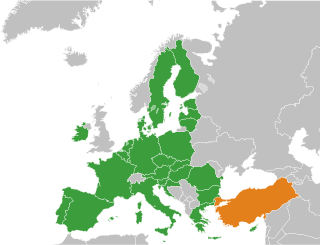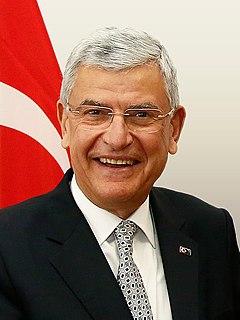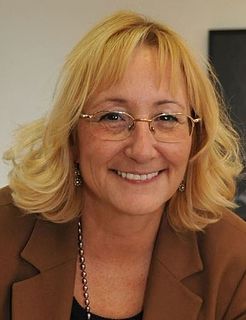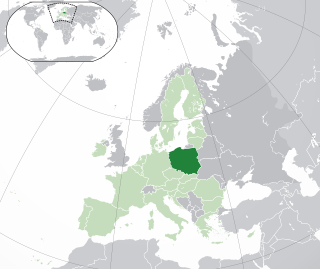The Republic of Cyprus is a unitary presidential representative republic, whereby the President of Cyprus is both head of state and head of government. Executive power is exercised by the government. Legislative power is vested in both the government and the parliament. The Judiciary is independent of the executive and the legislature.
Cyprus is a member of the United Nations along with most of its agencies as well as the Commonwealth of Nations, World Bank, International Monetary Fund and Council of Europe. In addition, the country has signed the General Agreement on Tariffs and Trade (GATT) and the Multilateral Investment Guarantee Agency Agreement (MIGA). Cyprus has been a member of the European Union since 2004 and in the second half of the 2012 it held the Presidency of the Council of the European Union.

The Foreign relations of Egypt are the Egyptian government's external relations with the outside world. Egypt's foreign policy operates along a non-aligned level. Factors such as population size, historical events, military strength, diplomatic expertise and a strategic geographical position give Egypt extensive political influence in the Middle East, Africa, and within the Non-Aligned Movement as a whole. Cairo has been a crossroads of the Arab world's commerce and culture for centuries, and its intellectual and Islamic institutions are at the center of the region's social and cultural landmarks.

The foreign relations of Finland are the responsibility of the president of Finland, who leads foreign policy in cooperation with the government. Implicitly the government is responsible for internal policy and decision making in the European Union. Within the government, preparative discussions are conducted in the government committee of foreign and security policy, which includes the Prime Minister and at least the Minister of Foreign Affairs and the Minister of Defence, and at most four other ministers as necessary. The committee meets with the President as necessary. Laws concerning foreign relations are discussed in the parliamentary committee of foreign relations. The Ministry of Foreign Affairs implements the foreign policy.
As one of the oldest Euro-Atlantic member states in the region of Southeast Europe, Greece enjoys a prominent geopolitical role as a middle power, due to its political and geographical proximity to Europe, Asia, the Middle East, and Africa. Its main allies are the United States, France, Italy, Bulgaria, the other NATO countries, Cyprus and the rest of the European Union.
The foreign policy of Sweden is based on the premise that national security is best served by staying free of alliances in peacetime in order to remain a neutral country in the event of war. In 2002, Sweden revised its security doctrine. The security doctrine still states that "Sweden pursues a policy of non-participation in military alliances," but permits cooperation in response to threats against peace and security. The government also seeks to maintain Sweden's high standard of living. These two objectives require heavy expenditures for social welfare, defense spending at rates considered low by Western European standards, and close attention to foreign trade opportunities and world economic cooperation.
Iceland established its foreign service in April 1940 when Denmark became occupied by Nazi Germany and ties between the two countries were severed. The Republic of Iceland was founded in 1944. The Icelandic foreign service grew slowly in the post-WWII period, but increased rapidly after the mid-1990s. Iceland's closest relations are with the Nordic states, the European Union and the United States. Iceland has been a member of the United Nations since 1946. Iceland was a founding member of the World Bank in 1946 and NATO in 1949. In terms of European integration, Iceland joined the EFTA in 1970, the EEA in 1992, and Schengen in 2001.

The European Union (EU) has expanded a number of times throughout its history by way of the accession of new member states to the Union. To join the EU, a state needs to fulfil economic and political conditions called the Copenhagen criteria, which require a stable democratic government that respects the rule of law, and its corresponding freedoms and institutions. According to the Maastricht Treaty, each current member state and the European Parliament must agree to any enlargement. The process of enlargement is sometimes referred to as European integration. This term is also used to refer to the intensification of co-operation between EU member states as national governments allow for the gradual harmonisation of national laws.

The High Representative of the Union for Foreign Affairs and Security Policy (HR/VP) is the chief co-ordinator and representative of the Common Foreign and Security Policy (CFSP) within the European Union (EU). The position is currently held by Josep Borrell.

Turkey is negotiating its accession to the European Union (EU) as a member state, following its application to accede to the European Economic Community, the predecessor of the EU, on 14 April 1987. After the ten founding members, Turkey was one of the first countries to become a member of the Council of Europe in 1949. The country was also an associate member of the Western European Union from 1992 to its end in 2011. Turkey signed a Customs Union agreement with the EU in 1995 and was officially recognised as a candidate for full membership on 12 December 1999, at the Helsinki summit of the European Council.

Cai-Göran Alexander Stubb is a Finnish politician who served as the Prime Minister of Finland from 2014 to 2015. He rose to politics as a researcher specialized in the affairs of the European Union and was elected to the European Parliament in 2004 as a member of the National Coalition Party. In 2008, Stubb was appointed as Minister for Foreign Affairs following a scandal surrounding his predecessor, Ilkka Kanerva. In 2011 Stubb stood for election to the Finnish Parliament for the first time and was elected MP with the second highest vote count in the election, which led to Stubb becoming the Minister for Europe and Foreign Trade in Jyrki Katainen's cabinet.
Denmark holds opt-outs from European Union policies in relation to security and defence, citizenship, police and justice, and the adoption of the euro. They were secured under the Edinburgh Agreement in 1992 after a referendum for the ratification of the Maastricht Treaty was rejected by Danish voters, as a package of measure to assuage concerns raised during that referendum.

The Minister of External Affairs of the Republic of Turkey is the government minister who heads the Ministry of External Affairs and is a member of the Cabinet of Turkey. The minister is responsible for overseeing the international relations of the government, though specific relations involving Turkey's accession negotiations with the European Union are handled by the Ministry of European Union Affairs.

Volkan Bozkır is a Turkish diplomat and politician who served as the Minister of European Union Affairs from November 2015 to May 2016, having previously served from August 2014 to August 2015. He concurrently served as the Chief Negotiator for Turkish Accession to the European Union during the same time.
The Ministry of European Union Affairs was a ministry of the Turkish government responsible for the accession process between the Republic of Turkey and the European Union. Formed on June 29, 2011, the ministry has been headed by six ministers in the past, namely Egemen Bağış (2011–2013), Mevlüt Çavuşoğlu (2013–2014), Volkan Bozkır, Ali Haydar Konca, Beril Dedeoğlu and Ömer Çelik, in office from 24 May 2016 onwards.

Hatice Beril Dedeoğlu was a Turkish academic who served as the Minister of European Union Affairs in the interim election government led by Prime Minister Ahmet Davutoğlu between 22 September and 17 November 2015. Having taken over from the previous interim cabinet minister Ali Haydar Konca following his resignation, Dedeoğlu served until Davutoğlu formed a new government after the November 2015 snap general election. She was, as required by the Constitution, of no political affiliation and was one of two women to serve in the interim cabinet, the other being Family and Social Policy Minister Ayşen Gürcan.

The Chief Negotiator for Turkish Accession to the European Union was the most senior official representing the Republic of Turkey during the country's accession negotiations to the European Union. The position was established on 17 January 2005 by Prime Minister Recep Tayyip Erdoğan. Following the establishment of the Ministry of European Union Affairs on 29 June 2011, the Minister of European Union Affairs was usually appointed concurrently to serve as the Chief Negotiator. The last Chief Negotiator was the EU Affairs Minister Ömer Çelik, in office between 2016–2018.

Poland has been a member state of the European Union since 1 May 2004, with the Treaty of Accession 2003 signed on 16 April 2003 in Athens as the legal basis for Poland's accession to the EU. The actual process of integrating Poland into the EU began with Poland's application for membership in Athens on 8 April 1994, and then the confirmation of the application by all member states in Essen from 9–10 December 1994. Poland's integration into the European Union is a dynamic and continuously ongoing process.

Marija Pejčinović Burić is a Croatian politician of the centre-right Croatian Democratic Union party who has worked as the 14th Minister of Foreign and European Affairs of Croatia and Deputy Prime Minister of Croatia from 19 June 2017 to 19 July 2019. She is the third woman to hold the post of foreign minister, following Kolinda Grabar-Kitarović and Vesna Pusić. Pejčinović Burić previously served as a Member of Parliament during its Sixth Assembly (2008–2011), representing the 6th electoral district.

The Secretary of State for the European Union (SEUE) is a senior official of the Ministry of Foreign Affairs, European Union and Cooperation of the Government of Spain. The SEUE is appointed by the Monarch with the advice of the Foreign Minister.



















